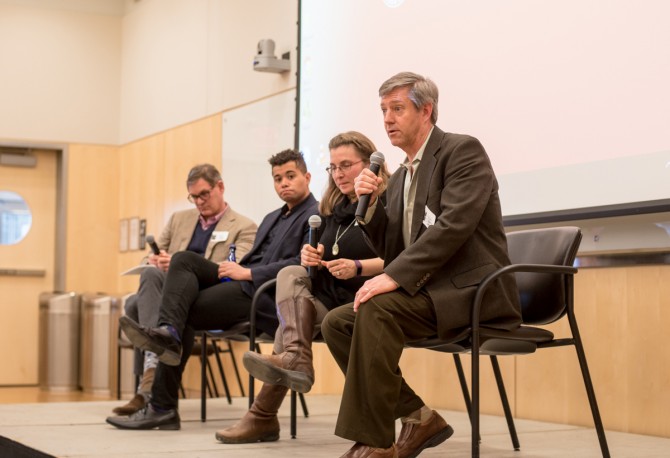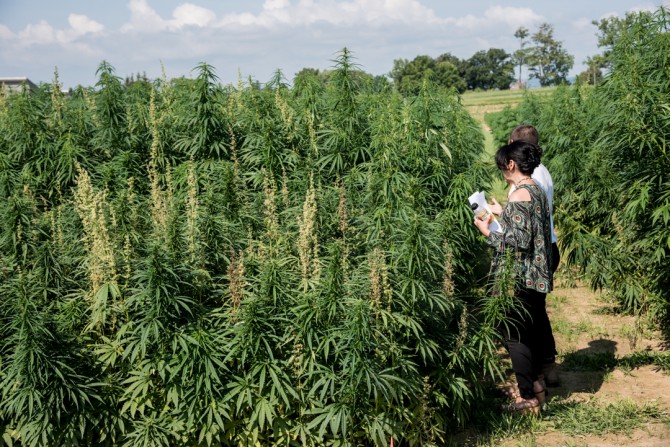Industrial hemp in New York expected to grow as research expands
By Krisy Gashler
Industrial hemp is growing beyond the hype.
Scientists, farmers, processors and government officials convened Feb. 28 at Cornell University for the state’s first industrial hemp research forum, part of Gov. Andrew M. Cuomo’s 2018 State of the State proposal to establish New York as a national leader in industrial hemp research, production and processing.
The upcoming growing season provides a second year of field testing by researchers at the College of Agriculture and Life Sciences (CALS), after New York become the 19th state to legalize hemp research trials in 2015. CALS researchers, along with those at Morrisville State College, are researching industrial hemp to improve agronomic outcomes for farmers. Cornell has been funded to identify and breed cultivars suitable for New York and establish certified seed production in the state.
This year, Cornell will expand cultivar trials to the northernmost and southernmost parts of the state, and has initiated a long-term hemp breeding program aided by $2 million in new state funding. Using genomics to speed the breeding process, the work will lead to the development of cultivars adapted to New York conditions.
Project lead Larry Smart, professor in the Horticulture Section of the School of Integrative Plant Science (SIPS), said that the breeding work is now underway, and estimates that cultivars optimized for New York growers could be ready for release in three to four years.
“Cornell and CALS are uniquely positioned – with our School of Integrative Plant Science and Cornell Cooperative Extension – to provide research-based answers and outreach to support this initiative for New York,” said Kathryn J. Boor ’80, the Ronald P. Lynch Dean of CALS, speaking at the forum held in Stocking Hall.
Cornell researchers conducted trials last year on the Ithaca campus, at the New York State Agricultural Experiment Station (NYSAES) in Geneva, and on 1,700 acres of hemp planted in collaboration with 24 farmers across the state. The first phase of work established insights into the most promising cultivars and optimal growing conditions for New York.
Hemp studies at Cornell span a range of expertise, from plant pathologists studying diseases to entomologists surveying for pests of hemp. Both are important given that there are no chemical controls registered for use on the plant. A team of 10 extension associates are building connections between researchers, farmers and processors, while biotechnology experts on campus are exploring metabolites of the plant.
Building on the initial work, Cornell plant breeders are testing cultivars and creating a database on their relative performance and grain qualities.
“We put New York on the national industrial hemp map, with strong support from Governor Cuomo and legislators including [Assemblywoman] Donna Lupardo [D-123rd] and [state Sen.] Tom O’Mara [R-58th],” said Smart.
Hemp has a multitude of uses, including as food, fiber, fabrics and biocomposites; it’s even being used as light but sturdy automobile door panels, according to Smart.
“There are so many uses for hemp,” he said. “We have a tremendous opportunity here in New York for entrepreneurs to develop new products.”
This growing season, Cornell will test hemp across the full latitudinal range of the state, from near the Canadian border at the W.H. Miner Agricultural Research Institute in Chazy to as far south as the Long Island Horticultural Research and Extension Center in Riverhead.
Additional trials will be held at research farms at the Ithaca campus, and Cornell researchers together with Cornell Cooperative Extension will support hemp growers expected plant as many as 3,500 acres in New York, according to Richard Ball, commissioner of the New York State Department of Agriculture and Markets.
Krisy Gashler is a freelance writer for the College of Agriculture and Life Sciences.
Media Contact
Get Cornell news delivered right to your inbox.
Subscribe


